
The Balkan Wars refers to a series of two conflicts that took place in the Balkan states in 1912 and 1913. In the First Balkan War, the four Balkan states of Greece, Serbia, Montenegro and Bulgaria declared war upon the Ottoman Empire and defeated it, in the process stripping the Ottomans of its European provinces, leaving only Eastern Thrace under the Ottoman Empire's control. In the Second Balkan War, Bulgaria fought against the other four original combatants of the first war. It also faced an attack from Romania from the north. The Ottoman Empire lost the bulk of its territory in Europe. Although not involved as a combatant, Austria-Hungary became relatively weaker as a much enlarged Serbia pushed for union of the South Slavic peoples. The war set the stage for the Balkan crisis of 1914 and thus served as a "prelude to the First World War".
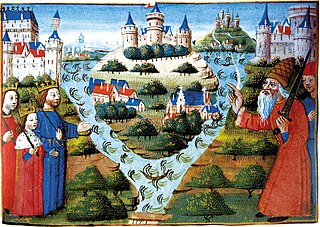
The Treaty of Verdun, agreed in August 843, divided the Frankish Empire into three kingdoms among the surviving sons of the emperor Louis I, the son and successor of Charlemagne. The treaty was concluded following almost three years of civil war and was the culmination of negotiations lasting more than a year. It was the first in a series of partitions contributing to the dissolution of the empire created by Charlemagne and has been seen as foreshadowing the formation of many of the modern countries of western Europe.

The Treaty of Passarowitz, or Treaty of Požarevac, was the peace treaty signed in Požarevac, a town that was in the Ottoman Empire but is now in Serbia, on 21 July 1718 between the Ottoman Empire and Austria of the Habsburg monarchy and the Republic of Venice.

Pax Britannica was the period of relative peace between the great powers during which the British Empire became the global hegemonic power and adopted the role of a "global policeman".
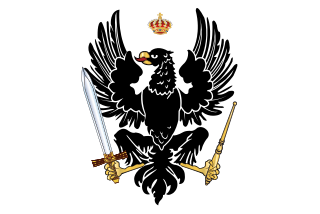
The Kingdom of Prussia was a German kingdom that constituted the state of Prussia between 1701 and 1918. It was the driving force behind the unification of Germany in 1871 and was the leading state of the German Empire until its dissolution in 1918. Although it took its name from the region called Prussia, it was based in the Margraviate of Brandenburg. Its capital was Berlin.

The Triple Entente describes the informal understanding between the Russian Empire, the French Third Republic, and the United Kingdom of Great Britain and Ireland as well as Romania, which joined later. It was built upon the Franco-Russian Alliance of 1894, the Entente Cordiale of 1904 between Paris and London, and the Anglo-Russian Entente of 1907. It formed a powerful counterweight to the Triple Alliance of Germany, Austria-Hungary, and Italy. The Triple Entente, unlike the Triple Alliance or the Franco-Russian Alliance itself, was not an alliance of mutual defence.

Louis Botha was a South African politician who was the first prime minister of the Union of South Africa – the forerunner of the modern South African state. A Boer war hero during the Second Boer War, he eventually fought to have South Africa become a British Dominion.
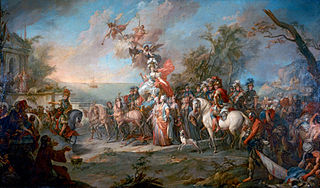
The Russo-Turkish War of 1768–1774 was a major armed conflict that saw Russian arms largely victorious against the Ottoman Empire. Russia's victory brought parts of Moldavia, the Yedisan between the rivers Bug and Dnieper, and Crimea into the Russian sphere of influence. Through a series of victories accrued by the Russian Empire led to substantial territorial conquests, including direct conquest over much of the Pontic–Caspian steppe, less Ottoman territory was directly annexed than might otherwise be expected due to a complex struggle within the European diplomatic system to maintain a balance of power that was acceptable to other European states and avoided direct Russian hegemony over Eastern Europe.
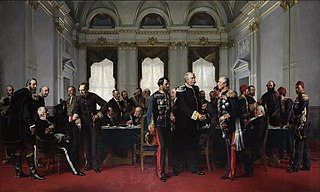
The Congress of Berlin was a diplomatic conference to reorganise the states in the Balkan Peninsula after the Russo-Turkish War of 1877–78, which had been won by Russia against the Ottoman Empire. Represented at the meeting were Europe's then six great powers: Russia, Great Britain, France, Austria-Hungary, Italy and Germany; the Ottomans; and four Balkan states: Greece, Serbia, Romania and Montenegro. The congress concluded with the signing of the Treaty of Berlin, replacing the preliminary Treaty of San Stefano that had been signed three months earlier.
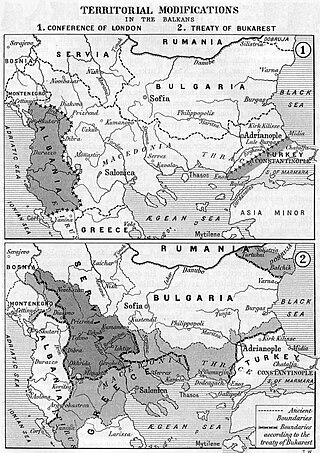
The Treaty of Bucharest was concluded on 10 August 1913, by the delegates of Bulgaria, Romania, Serbia, Montenegro and Greece. The Treaty was concluded in the aftermath of the Second Balkan War and amended the previous Treaty of London, which ended the First Balkan War. About one month later, the Bulgarians signed a separate border treaty with the Ottomans, who had regained some territory west of the Enos-Midia Line during the second war.

The Macedonian Wars were a series of conflicts fought by the Roman Republic and its Greek allies in the eastern Mediterranean against several different major Greek kingdoms. They resulted in Roman control or influence over Greece and the rest of the eastern Mediterranean basin, in addition to their hegemony in the western Mediterranean after the Punic Wars. Traditionally, the "Macedonian Wars" include the four wars with Macedonia, in addition to one war with the Seleucid Empire, and a final minor war with the Achaean League. The most significant war was fought with the Seleucid Empire, while the war with Macedonia was the second, and both of these wars effectively marked the end of these empires as major world powers, even though neither of them led immediately to overt Roman domination. Four separate wars were fought against the weaker power, Macedonia, due to its geographic proximity to Rome, though the last two of these wars were against haphazard insurrections rather than powerful armies. Roman influence gradually dissolved Macedonian independence and digested it into what was becoming a leading empire. The outcome of the war with the now-deteriorating Seleucid Empire was ultimately fatal to it as well, though the growing influence of Parthia and Pontus prevented any additional conflicts between it and Rome.
In diplomatic history, the Eastern question was the issue of the political and economic instability in the Ottoman Empire from the late 18th to early 20th centuries and the subsequent strategic competition and political considerations of the European great powers in light of this. Characterized as the "sick man of Europe", the relative weakening of the empire's military strength in the second half of the eighteenth century threatened to undermine the fragile balance of power system largely shaped by the Concert of Europe. The Eastern question encompassed myriad interrelated elements: Ottoman military defeats, Ottoman institutional insolvency, the ongoing Ottoman political and economic modernization programme, the rise of ethno-religious nationalism in its provinces, and Great Power rivalries.
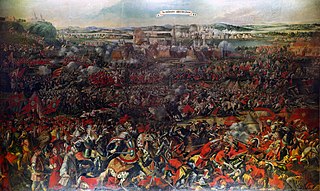
The Great Turkish War, also called the Wars of the Holy League, was a series of conflicts between the Ottoman Empire and the Holy League consisting of the Holy Roman Empire, Poland-Lithuania, Venice, Russia, and Habsburg Hungary. Intensive fighting began in 1683 and ended with the signing of the Treaty of Karlowitz in 1699. The war was a defeat for the Ottoman Empire, which for the first time lost large amounts of territory, in Hungary and the Polish–Lithuanian Commonwealth, as well as part of the western Balkans. The war was significant also by being the first time that Russia was involved in an alliance with Western Europe.
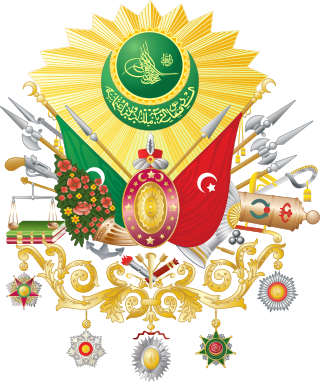
The dissolution of the Ottoman Empire (1908–1922) began with the Young Turk Revolution which restored the constitution of 1876 and brought in multi-party politics with a two-stage electoral system for the Ottoman parliament. At the same time, a nascent movement called Ottomanism was promoted in an attempt to maintain the unity of the Empire, emphasising a collective Ottoman nationalism regardless of religion or ethnicity. Within the empire, the new constitution was initially seen positively, as an opportunity to modernize state institutions and resolve inter-communal tensions between different ethnic groups.

Relations between the Roman and Iranian states were established c. 92 BC. It was in 69 BC that the two states clashed for the first time; the political rivalry between the two empires would dominate much of Western Asia and Europe until 628. Initially commencing as a rivalry between the Parthians and Rome, from the 3rd to mid-7th centuries the Roman Empire and its rival Sassanid Persia were recognized as two of the leading powers in the world.
The Russo-Turkish wars were a series of twelve wars fought between the Russian Empire and the Ottoman Empire between the 16th and 20th centuries. It was one of the longest series of military conflicts in European history. Except for the war of 1710–11 and the Crimean War, which is often treated as a separate event, the conflicts ended disastrously for the Ottoman Empire; conversely, they showcased the ascendancy of Russia as a European power after the modernization efforts of Peter the Great in the early 18th century.

A treaty battleship was a battleship built in the 1920s or 1930s under the terms of one of a number of international treaties governing warship construction. Many of these ships played an active role in the Second World War, but few survived long after it.
The Treaty of Athens between the Ottoman Empire and the Kingdom of Greece, signed on 14 November 1913, formally ended hostilities between them after the two Balkan Wars and ceded Macedonia—including the major city of Thessaloniki— most of Epirus, and many Aegean islands to Greece.

The history of Turkey, understood as the history of the region now forming the territory of the Republic of Turkey, includes the history of both Anatolia and Eastern Thrace. These two previously politically distinct regions came under control of the Roman Empire in the second century BC, eventually becoming the core of the Roman Byzantine Empire. For times predating the Ottoman period, a distinction should also be made between the history of the Turkic peoples, and the history of the territories now forming the Republic of Turkey From the time when parts of what is now Turkey were conquered by the Seljuq dynasty, the history of Turkey spans the medieval history of the Seljuk Empire, the medieval to modern history of the Ottoman Empire, and the history of the Republic of Turkey since the 1920s.